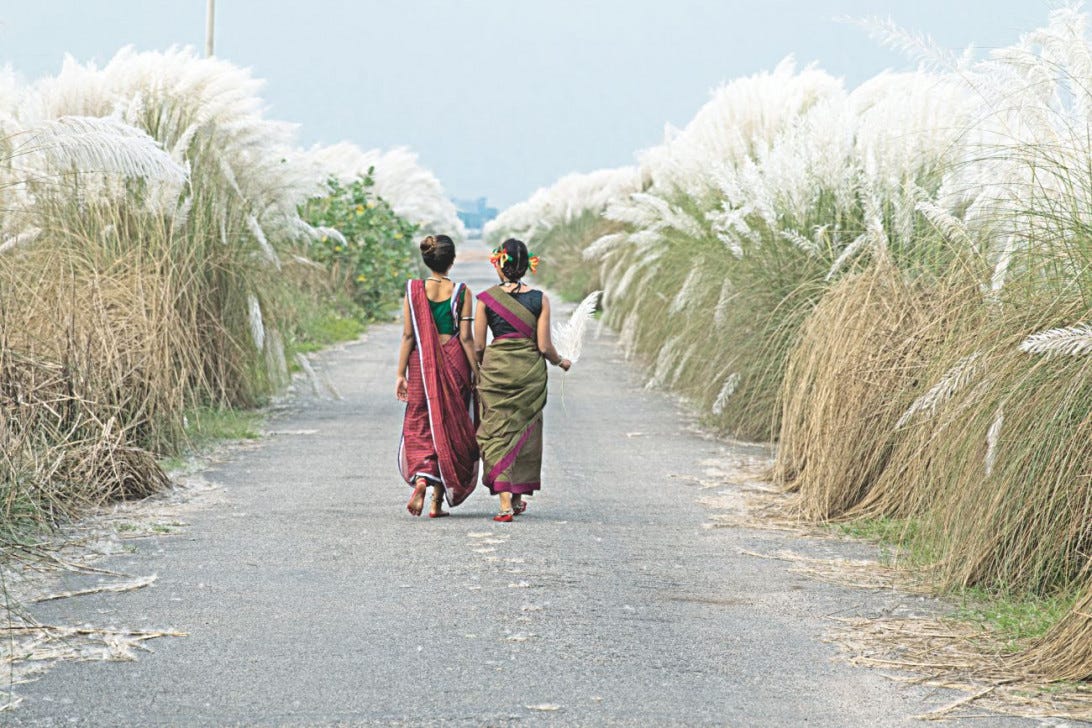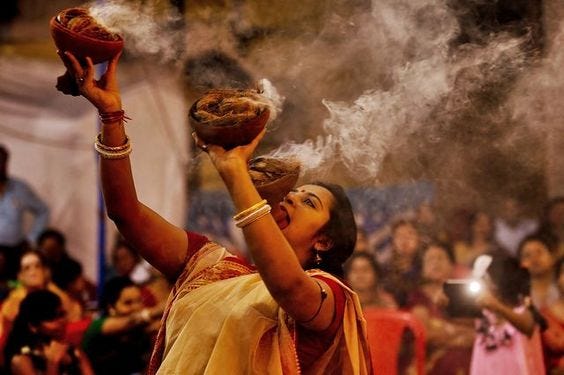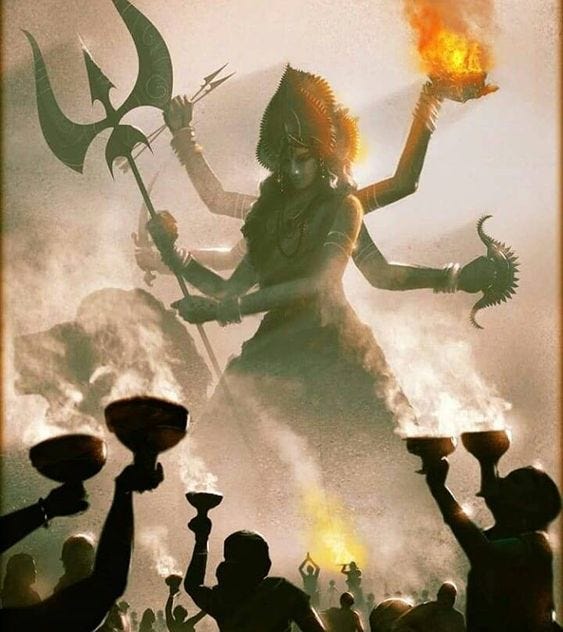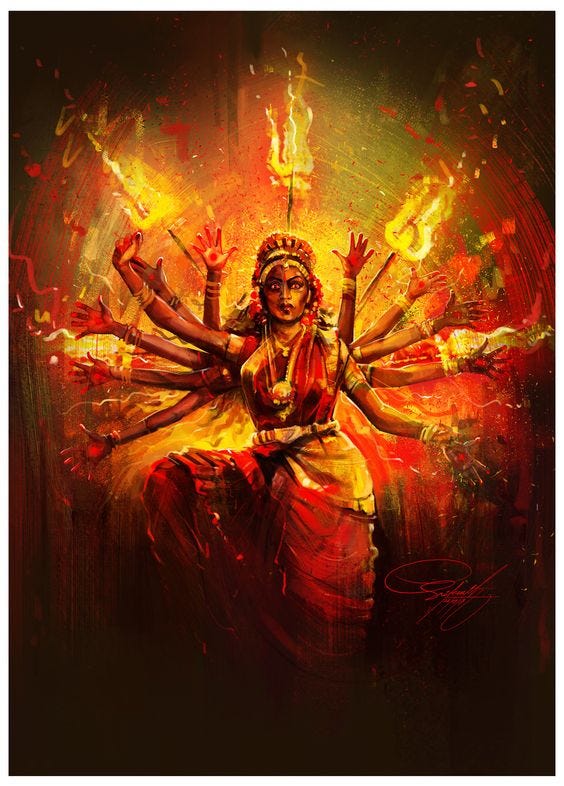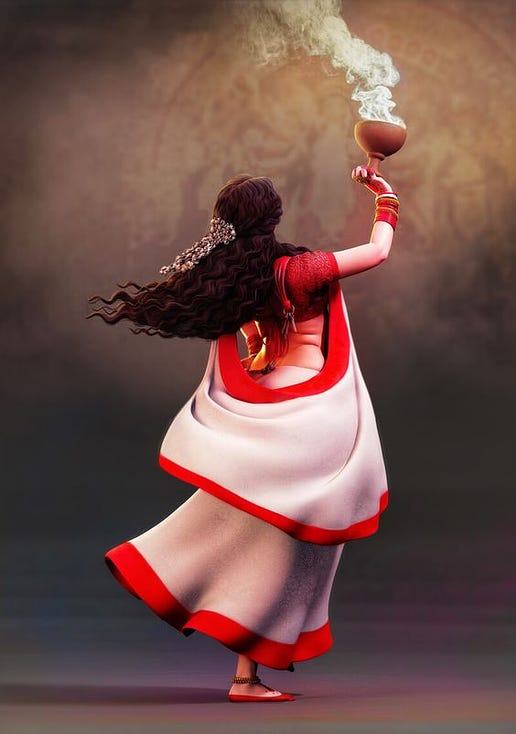Berkana - Myths and Manifestations
Today’s pickings Myths and ManifestationsAutumn in India begins with the celebration of the menacing ten-armed GoddessDear Reader, Welcome to Berkana! Today let me take you inside the fall festivities of my hometown (Kolkata). Allow me to familiarize you with our way of expressing gratitude towards the feminine aspects of the universe. This is piece is short and evocative, if you wish to read a detailed cultural tour, let me know in the comments below. Next week I am planning to bring to you many inspiring stories from the upper Himalayas. So stay tuned to find out more! Now, let’s get on with today’s journey! Change and TransformationRight now, when most of the world is bursting into dazzling amber, maroon, gold, and bronze colors of the fall, here in the Eastern part of India, we are just getting done with the monsoon. The romance of the fall that we experience here in the Indian state of Bengal and its abundant harvest is unique and one of its kind. Since we live near the Equator, the transitions between the seasons are less extreme. Like a slow dance, nature changes almost secretively from one season to another. However, it fails to hide a few transitions, like the sweet fragrance of the Shiuli blossoms hanging about the air or the white kasha flowers announcing the arrival of the new golden harvest of wheat. The dew-laden crops are ready to be reaped from the soil - a fruitful liberation of the farmers from the year-long hard work. By the end of the monsoon and the onset of the fall, we prepare to celebrate the power and beauty of one thing that enables our harvests - Water. Ebb and FlowThe river Bramhaputra meanders through Bangladesh and crosses the border to enter India via the state of Bengal. As the river enters the valley of Hindustan we rename her as Ganga - the holy mother who purifies all sins of this mortal land that she touches. She also impregnates our land with the minerals she carries from the Himalayan glaciers. Because of the river Ganga, the plains of Bengal have one of the most fertile black soil on the entire planet. Whatever you plant here grows without protest. The reason why pre-independent India was called Golden Bird by the British. The mystery around the water is synonymous with the mystery around womanhood. The life-giving element of nature is considered sacred in the majority of the cultures across the Indian sub-continent. Water is symbolic of the innate feminine aspect of nature, and hence most Indian rivers have feminine names and are considered mother goddesses, at whose mercy life prospers. Whose kind ripples and flow can enable life and whose vengeful temper can take it away. In the Eastern states of India, people are aware that floods and famines are both extreme examples of the power of water. To such immense power of the feminine, we bow our heads and surrender our egos. Celebrating the PrakritiNow, it should not come as a surprise that we, east Indians, are obsessed with our Goddesses and the existence of the mystical feminine. From what remained of the 4700 years old Indus valley civilization, Shaktism (worship of the Goddess Shakti) took root in the eastern side of India. The holy Prakriti (nature), in all its glory, is worshipped in the form of Devi (Goddess). Therefore, the arrival of the fall (harvest season) marks the awakening of the divine feminine. From October to November, the country shimmers in colorful hues and lights. The grandest festivals of India - both Navaratri and Diwali, are celebrated after the arrival of Autumn. During Dusshera, the supreme Goddess Durga is called upon to manifest in her fierce glory. To welcome the mother Goddess, the women adorn themselves in white and red sarees and glittering gold ornaments - an imitation of the Goddess herself. They then gather in the courtyards of the community house, holding the dhunochi (burning dry coconut husk in a bowl with handles) in their mouths and both hands and dance rhythmically to the auspicious beats of the dhak (traditional drums). A befitting and daring welcome to our Goddess of war. Durga, another manifestation of Shakti (the primordial Goddess in the Hindu pantheon and consort of Shiva, the supreme God), is also a symbolic subversion of the traditional soft feminine nature. She is one of the most powerful goddesses in the Hindu pantheon. She is revered for her ferocity and unparalleled strength. The entire nation bows to the power of this ultimate form of feminine self-actualization. The celebration lasts for nine nights. Each agile and changing aspect of the feminine is worshipped on these festive days. The Lore of AwakeningThe story of incarnation and self-actualization of Durga is threatening to the diabolical misogyny. In the brief history of feminist mythology, Durga’s stance is that of empowerment. Legend has it that a demon named Mahisasura was being extremely problematic. The most powerful of the Gods were unable to handle him. He wreaked havoc on Earth and used his power to torture and plunder humans. Many gods challenged the demon, only to return from the battlefield, scared and defeated. An ultimate war was inevitable to end his reign. However, the Gods were not powerful enough to tame this mischievous demon. The Gods then sought the advice of the wise Shiva, who calmly suggested that the universe is composed of both male and feminine energies. Therefore, if Mahisasura has conquered all that is masculine, he could only be defeated by a feminine manifestation of the supreme source. The Gods then assembled to recite chants and prayers for seven days to awaken the primordial Goddess from her slumber. They unitedly begged her to show mercy and save the world. At the end of the seventh day, the Goddess manifested fully formed in her arresting frantic rage, ready to wipe out the evil. Durga, alongside her gigantic pet Lion/Tiger, is a fearsome Goddess. She is often depicted with ten hands wielding ten different weapons simultaneously. When the wild feminine rose in her magnificent glory, the entire universe stood still entranced by her grandeur, except Mahisasura. Drunk with power, he ridiculed the Gods for sending a woman to kill him. In his blind arrogance, he ended up being annihilated by the Goddess. Mahisaura represents society’s blind toxic masculine ego that underestimates feminine strength. Women are always at the receiving end of either pity, violence, or ridicule. The rise of Durga represents the end of such violations in the hands of a divine mother. As a result, Navaratri (9 nights) is celebrated for nine days. Nine, being symbolic of the human gestation period and hence associated with the Mother Goddess. Durga is the representation of the mother consciousness and her ancient powers. The archetypal Goddess is our longing to abandon our ego and be on the path of virtuous endeavors. Durga is an archetype that instills unwavering courage we all can access from within in the face of adversities. As per the lore, Durga brought the demon and his gruesome reign to an end. However, true evil is limitless. It changes shapes and forms and parades with its insidious agenda among impressionable people. True evil is like darkness is deliberate, ever-present, and infinite. At this point in history, when the world pushes us towards the edge of darkness, where the act of violence against the innocent is normalized, we have to collectively awaken our inner power and find the courage to dissent. We have to awaken the symbolic energy of Durga within ourselves. The Correlation between Autumn and the GoddessesIt might seem strange that for celebrating the feminine side of nature, we choose the season of barren trees and harvested stubble instead of the spring which symbolizes birth. However, in this particular festival, we celebrate a different side of the feminine. The idealistic fixations of our culture on the nurturing aspect of nature make us blind to her ability to destroy. The forces of creation and destruction exist simultaneously. Like fraternal twins, they are born from the same womb of existence but with two different purposes. With the onset of fall, our culture enables us to see beyond our assumptions and perceive the dying side of nature. These festive philosophies help us understand the process of death and its inevitability. The festivals of fall also encourage us to stop overanalyzing things of the past. It inspires us to find meaning and purpose in the endings. It reminds us of the temporary nature of everything, thus allowing us to let go. In our culture, we believe that the Goddess is the void. She is the emptiness of space that holds the whole universe together. She is the supermassive black hole around which the spiraling galaxies revolve. Everything else exists because she does. She is the beginning and the end of the world as we know it. She is both timeless and ephemeral. She is the point at which the polarities merge. She is the raw energy that inspires creativity and flow. Therefore in the spirit of her awakened rebelliousness, we call upon her whenever one departs to accomplish something great. In Bengal, it is a custom to say her name twice (Durga! Durga!) before someone leaves home to go somewhere. Dear reader, this fall, I pray, may the universe move in your direction and dance with your energy. May you always be guided on your path of constant strive for greatness and be brave in the face of adversities. Durga! Durga! |
Older messages
Walking Invisible - An Essay on Street Children of Lebanon
Saturday, October 30, 2021
We need more art to provoke and catalyze change
02-Dance of the heretics-The Whirling Dervishes
Saturday, October 23, 2021
“Sell your cleverness and buy bewilderment.” - Mawlana Jalal-al-Din Rumi
01-Dance of the Heretics - Sufism an Introduction
Saturday, October 16, 2021
On the look-out for the whirling dervishes on the vibrant streets of Istanbul
Shadows of memories from the land of Sand and Snow
Saturday, October 9, 2021
Two magnificent yet obscure churches and some well-observed nuances of life
02 - MANA WĀHINE TOA - The Rise of the Fierce Wāhine Māori
Sunday, October 3, 2021
The gentle uprising of the ancient feminine lurking behind the shadows of the Mānuka trees
You Might Also Like
🧙♂️ How one creator 2X'd his sponsorship revenue
Sunday, December 29, 2024
And why this is HUGE news for smaller creators… ͏ ͏ ͏ ͏ ͏ ͏ ͏ ͏ ͏ ͏ ͏ ͏ ͏ ͏ ͏ ͏ ͏ ͏ ͏ ͏ ͏ ͏ ͏ ͏ ͏ ͏ ͏ ͏ ͏ ͏ ͏ ͏ ͏ ͏ ͏ ͏ ͏ ͏ ͏ ͏ ͏ ͏ ͏ ͏ ͏ ͏ ͏ ͏ ͏ ͏ ͏ ͏ ͏ ͏ ͏ ͏ ͏ ͏ ͏ ͏ ͏ ͏ ͏ ͏ ͏ ͏ ͏ ͏ ͏ ͏ ͏ ͏ ͏ ͏ ͏ ͏ ͏
For Authors: 1-Day Facebook Groups Book Posts to 250,000+ Readers
Sunday, December 29, 2024
Group Posts to 250K Facebook Readers "ContentMo is at the top of my promotions list because I always see a spike in sales when I run one of their promotions. The cherry on my happy sundae with
52 things I learned this year
Saturday, December 28, 2024
And you should never start a chat this way ͏ ͏ ͏ ͏ ͏ ͏ ͏ ͏ ͏ ͏ ͏ ͏ ͏ ͏ ͏ ͏ ͏ ͏ ͏ ͏ ͏ ͏ ͏ ͏ ͏ ͏ ͏ ͏ ͏ ͏ ͏ ͏ ͏ ͏ ͏ ͏ ͏ ͏ ͏ ͏ ͏ ͏ ͏ ͏ ͏ ͏ ͏ ͏ ͏ ͏ ͏ ͏ ͏ ͏ ͏ ͏ ͏ ͏ ͏ ͏ ͏ ͏ ͏ ͏ ͏ ͏ ͏ ͏ ͏ ͏ ͏ ͏ ͏ ͏ ͏ ͏ ͏ ͏ ͏
🧙♂️ "I need more followers first..."
Saturday, December 28, 2024
The #1 brand deal MYTH that's keeping you broke... ͏ ͏ ͏ ͏ ͏ ͏ ͏ ͏ ͏ ͏ ͏ ͏ ͏ ͏ ͏ ͏ ͏ ͏ ͏ ͏ ͏ ͏ ͏ ͏ ͏ ͏ ͏ ͏ ͏ ͏ ͏ ͏ ͏ ͏ ͏ ͏ ͏ ͏ ͏ ͏ ͏ ͏ ͏ ͏ ͏ ͏ ͏ ͏ ͏ ͏ ͏ ͏ ͏ ͏ ͏ ͏ ͏ ͏ ͏ ͏ ͏ ͏ ͏ ͏ ͏ ͏ ͏ ͏ ͏ ͏ ͏ ͏ ͏
Guidance/advice for all of 2025?
Saturday, December 28, 2024
Copywriting involves optimizing every page you have. What if you increased the effectiveness of each of these pages?? Let's say you have 1000 visitors per month, and you increase each by 10%:
Closes in 4 Hours • New Year's Day Newsletter Promo for Authors ●
Saturday, December 28, 2024
Book Your Spot Now in Our New Year's Day Holiday Books Email Newsletter ! Book Your Spot in Our New Year's Day Email Newsletter Enable Images
2025 Personal Development Goals 🎓
Friday, December 27, 2024
New year, new goals? ͏ ͏ ͏ ͏ ͏ ͏ ͏ ͏ ͏ ͏ ͏ ͏ ͏ ͏ ͏ ͏ ͏ ͏ ͏ ͏ ͏ ͏ ͏ ͏ ͏ ͏ ͏ ͏ ͏ ͏ ͏ ͏ ͏ ͏ ͏ ͏ ͏ ͏ ͏ ͏ ͏ ͏ ͏ ͏ ͏ ͏ ͏ ͏ ͏ ͏ ͏ ͏ ͏ ͏ ͏ ͏ ͏ ͏ ͏ ͏ ͏ ͏ ͏ ͏ ͏ ͏ ͏ ͏ ͏ ͏ ͏ ͏ ͏ ͏ ͏ ͏ ͏ ͏ ͏ ͏ ͏ ͏ ͏ ͏ ͏ ͏ ͏ ͏ ͏ ͏
The Weekender, December 27, 2024
Friday, December 27, 2024
The last one of the year
Closes Tonight • New Year's Day Newsletter Promo for Authors ●
Friday, December 27, 2024
Book Your Spot Now in Our New Year's Day Holiday Books Email Newsletter ! Book Your Spot in Our New Year's Day Email Newsletter Enable Images
🧙♂️ "Maybe next year will be different..."
Friday, December 27, 2024
How many times have you told yourself that? ͏ ͏ ͏ ͏ ͏ ͏ ͏ ͏ ͏ ͏ ͏ ͏ ͏ ͏ ͏ ͏ ͏ ͏ ͏ ͏ ͏ ͏ ͏ ͏ ͏ ͏ ͏ ͏ ͏ ͏ ͏ ͏ ͏ ͏ ͏ ͏ ͏ ͏ ͏ ͏ ͏ ͏ ͏ ͏ ͏ ͏ ͏ ͏ ͏ ͏ ͏ ͏ ͏ ͏ ͏ ͏ ͏ ͏ ͏ ͏ ͏ ͏ ͏ ͏ ͏ ͏ ͏ ͏ ͏ ͏ ͏ ͏ ͏ ͏ ͏ ͏ ͏ ͏ ͏
